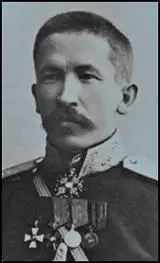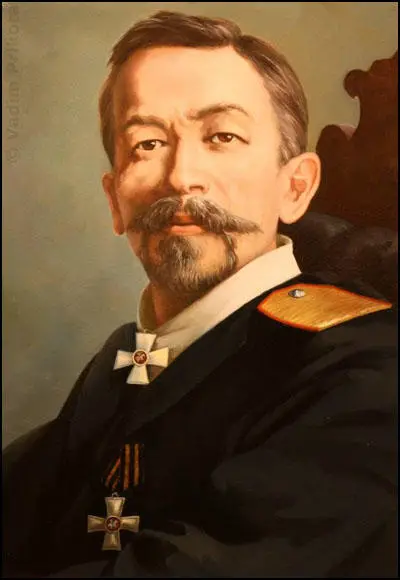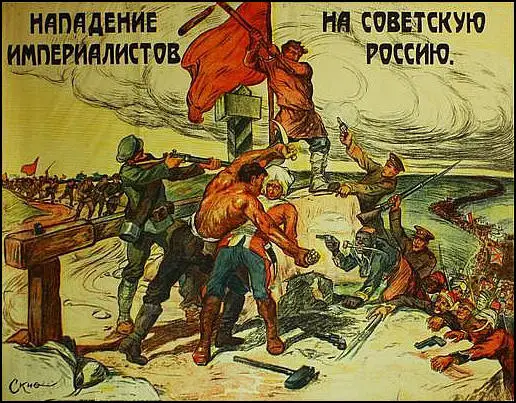Lavr Kornilov

Lavr Kornilov was born in Ust-Kamenogorsk, Siberia, in 1870. Little is known of his early life but later stories insisted that he came "from the people" as he was the "son of a poor Cossack". (1)
After graduating from the Mikhailovsky Artillery Training Corps in 1892 he was commissioned and posted to Turkestan. He also studied at the General Staff Academy (1895-1898) before being assigned to espionage duties in Iran and India. (2)
Kornilov was decorated during the Russo-Japanese War and served as military attaché in China from 1907 to 1911. On the outbreak of the First World War he commanded Infantry divisions on the Eastern Front. He was captured by the Austro-Hungarian Army in Galicia in 1915 but escaped the following year and was given command of the 25th Army Corps on the South-West Front. (3)
According to Alexander Rabinowitch, the author of The Bolsheviks Come to Power: The Revolution of 1917 in Petrograd (2004): "Kornilov... was short, lean, noticeably bandy-legged in stature, straightforward and tough in manner, Kornilov was distinguished by his narrow beard, his thick graceful mustache, and the slanted eyes and high cheekbones of his Mongolian forebears." (4)
Lavr Kornilov and the Provisional Government
When the Tsar Nicholas II abdicated a Provisional Government, headed by Prince George Lvov, was formed. Soon afterwards Kornilov was appointed Commander-in-Chief of the Petrograd Garrison. Kornilov wanted to use force to deal with the Bolshevik agitators in the Russian Army. Alexander Guchkov, the Minister of War, disagreed, and he was sent back to the Eastern Front. (5)
In May, 1917, Alexander Kerensky became War Minister. He appointed General Alexei Brusilov as the Commander in Chief of the Russian Army. He toured the Eastern Front where he made a series of emotional speeches where he appealed to the troops to continue fighting. On 18th June, Kerensky announced a new war offensive. According to David Shub: "The main purpose of the drive was to force the Germans to return to the Russian front the divisions which they had diverted to France in preparation for an all-out offensive against the Western Allies. At the same time, the Provisional Government hoped this move would restore the fighting spirit of the Russian Army." (6)
Encouraged by the Bolsheviks, who favoured peace negotiations, there were demonstrations against Kerensky in Petrograd. The Bolshevik popular slogan "Peace, Bread and Land", helped to increase support for the revolutionaries. By the summer of 1917, the membership of the Bolshevik Party had grown to 240,000. The Bolsheviks were especially favoured by the soldiers who found Lenin's promise of peace with Germany extremely attractive. (7)
Prince George Lvov was in conflict with Victor Chernov over the changes taking place over land ownership. Chernov issued circulars that supported the actions of the local land committees in reducing the rents of land leased by the peasants, seizing untilled fields for peasant use and commanding prisoner-of-war labour from private landowners. Lvov accused Chernov of going the back of the government and he prevailed on the ministry of justice to challenge the legality of Chernov's circulars. Without the full support of the cabinet in this dispute, Lvov resigned as prime minister on 7th July. (8)
Kerensky became the new prime minister and soon after taking office, he announced another new offensive. Soldiers on the Eastern Front were dismayed at the news and regiments began to refuse to move to the front line. There was a rapid increase in the number of men deserting and by the autumn of 1917 an estimated 2 million men had unofficially left the army. Some of these soldiers returned to their homes and used their weapons to seize land from the nobility. Manor houses were burnt down and in some cases wealthy landowners were murdered. Kerensky and the Provisional Government issued warnings but were powerless to stop the redistribution of land in the countryside.
After the failure of the July Offensive on the Eastern Front, Kerensky replaced General Alexei Brusilov with General Lavr Kornilov, as Supreme Commander of the Russian Army. Kornilov had a fine military record and unlike most of the Russian senior officers, came from a poor breakdown. "This combination made Kornilov the man of destiny in the eyes of those conservative and moderate politicians... who hoped that through him the Revolution might be tamed. But not only the right pinned its hopes on Kornilov. Kerensky and some in in his entourage hoped to use the general to destroy any future Bolshevik threat and to remove or diminish the tutelage of the soviets over the Provisional Government." (9)
The Kornilov Revolt
Morgan Philips Price, a British journalist, saw Kornilov make a speech on 24th August 1917: "A wiry little little man with strong Tartar features. He wore a general's full-dress uniform with a sword and red-striped trousers. His speech was begun in a blunt soldierly manner by a declaration that he had nothing to do with politics. He had come there, he said, to tell the truth about the condition of the Russian army. Discipline had simply ceased to exist. The army was becoming nothing more than a rabble. Soldiers stole the property, not only of the State, but also of private citizens, and scoured the country plundering and terrorizing. The Russian army was becoming a greater danger to the peaceful population of the western provinces than any invading German army could be." (10)
However, the two men soon clashed about military policy. Kornilov wanted Kerensky to restore the death-penalty for soldiers and to militarize the factories. He told his aide-de-camp, that "the time had come to hang the German agents and spies, headed by Lenin, to disperse the Soviet of Workers' and Soldiers' Deputies so that it can never reassemble." On 7th September, Kornilov demanded the resignation of the Cabinet and the surrender of all military and civil authority to the Commander in Chief. Kerensky responded by dismissing Kornilov from office and ordering him back to Petrograd. (11)
Kornilov now sent troops under the leadership of General Aleksandr Krymov to take control of Petrograd. Kornilov believed that he was going to become military dictator of Russia. This became known as the Kornilov Revolt. He had the open support of a number of prominent Russian industrialists, headed by Aleksei Putilov, owner of the steelworks and the leading Petrograd banker. Others involved in the plot included Alexander Guchkov, a backer of an organization called the Union for Economic Revival of Russia. According to one source these industrialists had raised 4 million rubles for Kornilov's conspiracy. (12)
Kerensky was now in danger and so he called on the Soviets and the Red Guards to protect Petrograd. The Bolsheviks, who controlled these organizations, agreed to this request, but in a speech made by their leader, Lenin, he made clear they would be fighting against Kornilov rather than for Kerensky. Within a few days Bolsheviks had enlisted 25,000 armed recruits to defend Petrograd. While they dug trenches and fortified the city, delegations of soldiers were sent out to talk to the advancing troops. Meetings were held and Kornilov's troops decided to refuse to attack Petrograd. General Krymov committed suicide and Kornilov was arrested and taken into custody. (13)

Harold Williams, a journalist working for the Daily Chronicle, pointed out: "The Kornilov Affair has intensified mutual distrust and completed the work of destruction. The Government is shadowy and unreal, and what personality it had has disappeared before the menace of the Democratic Assembly. Whatever power there is again concentrated in the hands of the Soviets, and, as always happens when the Soviets secure a monopoly of power, the influence of the Bolsheviks has increased enormously. Kerensky has returned from Headquarters, but his prestige has declined, and he is not actively supported either by the right or by the left." (14)
Another journalist, Arthur Ransome, confirmed this view. Roland Chambers, the author of The Last Englishman: The Double Life of Arthur Ransome (2009) has argued: "While Petrograd was fortified by the same troops that had mobbed the streets during the July Days, the railway union held up trains carrying Kornilov's supplies. When the advance slowed, Bolshevik envoys were sent out to explain to the soldiers under Kornilov's command that the Provisional Government was not, as they had supposed, in any danger. The whole business had simply been a misunderstanding cooked up by two ambitious tyrants: the first being General Kornilov, the second already notorious for betraying every promise he had made to the people. For the moment, it would be in the Soviet's best interests if they simply laid down their arms... With the collapse of the Kornilov offensive, the immediate threat from the Right had been removed. Kornilov's second-in command - the man who had actually led the mutiny - committed suicide. Kornilov himself and twenty-three of his generals were arrested and incarcerated." (15)
The Russian Civil War
Kornilov was arrested but he escaped from Bikhov jail and formed the anti-Bolshevik Volunteer Army. After his escape from prison, Kornilov and his supporters made their way to the Don region, which was controlled by Cossacks. Here they linked up with General Mikhail Alekseev. Kornilov became the military commander of the anti-Bolshevik Volunteer Army with Alekseev as the political chief. The historian, Arno J. Mayer, the author of The Furies: Violence and Terror in the French and Russian Revolutions (2002) has claimed that Kornilov told his associates "the greater the terror, the greater our victories" and that he was willing "to set fire to half the country and shed the blood of three-quarters of all Russians" in order to gain victory. (16) Victor Serge claims that in the village of Lezhanka alone, bands of Kornilov's officers killed more than 500 people. (17)
People who were willing to take up arms against the Bolshevik government became known as the White Army. However, they had mixed opinions about what kind of Russia they wanted: "Officers and politicians who remained pro-monarchist attached themselves to each of the White armies because politically there was nowhere else for them to turn. Tension would surface in each of the White armies between those favouring the more democratic progressivism of the February Revolution and those who could not reconcile themselves to it. They made a common if uneasy cause against the Bolsheviks." (18)

General Peter Wrangel, a commander in the north Caucasus, claimed that it was difficult to hold on to areas taken from the Red Army: "In the course of the last few months my command had received considerable reinforcements. In spite of heavy losses, its strength was almost normal. We were well supplied with artillery, technical equipment, telephones, telegraphs, and so on, which we had taken from the enemy. When the Reds had succeeded in making themselves masters of the Kuban district they had recourse to conscription there. Now these forced recruits were deserting en masse, and coming over to us to defend their homes. They were good fighters, but once their own village was cleared of Reds, many of them left the ranks to cultivate their land once more." (19)
The White Army initially had success in the Ukraine where the Bolsheviks were unpopular. In January 1918 General Lavr Kornilov had around 3,000 men. To crush this force, the Bolsheviks sent an army of 10,000. On 24th February 1918, the Red Army captured Rostov. Kornilov, badly outnumbered, escaped to Ekaterinodar, the capital of the Kuban Soviet Republic. However, in the early morning of 13th April, a Soviet shell landed on his farmhouse headquarters and killed him. He was buried in a nearby village. A few days later, when the Bolsheviks gained control of the village, they unearthed Kornilov's coffin, dragged his corpse to the main square and burnt his remains on the local rubbish dump. (20)
Primary Sources
(1) In his book My Reminiscences of the Russian Revolution, the journalist, Morgan Philips Price described Kornilov making a speech in Moscow on 25th August, 1917.
A wiry little little man with strong Tartar features. He wore a general's full-dress uniform with a sword and red-striped trousers. His speech was begun in a blunt soldierly manner by a declaration that he had nothing to do with politics. He had come there, he said, to tell the truth about the condition of the Russian army. Discipline had simply ceased to exist. The army was becoming nothing more than a rabble. Soldiers stole the property, not only of the State, but also of private citizens, and scoured the country plundering and terrorizing. The Russian army was becoming a greater danger to the peaceful population of the western provinces than any invading German army could be.
(2) Harold Williams, Daily Chronicle (29th September, 1917)
The Kornilov Affair has intensified mutual distrust and completed the work of destruction. The Government is shadowy and unreal, and what personality it had has disappeared before the menace of the Democratic Assembly. Whatever power there is again concentrated in the hands of the Soviets, and, as always happens when the Soviets secure a monopoly of power, the influence of the Bolsheviks has increased enormously. Kerensky has returned from Headquarters, but his prestige has declined, and he is not actively supported either by the right or by the left.
(3) David Shub, Lenin (1948)
On 30 July Kerensky appointed Boris Savinkov, former Political Commissar of the Eighth Army, as deputy Minister of War, at the same time naming as Commander in Chief General Kornilov, a man characterized by General Brusilov as "a man with the heart of a lion and the brains of a lamb". The son of a Siberian Cossack, General Lavr Kornilov had distinguished himself during the retreat of the Eighth Army in Galicia. After the Revolution, he had briefly commanded the Petrograd garrison. Transferred to the south-western front, he took command once more of the Eighth Army, where he met Savinkov, a right-wing Socialist Revolutionary and former terrorist. On 19 July the Executive Committee of the south-western front had wired Kerensky requesting that the armies of the front "be placed under the command of a leader capable of uniting and inspiring all the wavering elements and securing a victorious offensive by the sheer force and determination of his will". The next day Kornilov received the appointment.
Three days later Kornilov demanded an immediate cessation of the offensive on all sectors, in order to preserve the Army, and the introduction of the death penalty for deserters at the front. His demands were met, and within another week Kornilov was Commander in Chief of all the Russian armies.
Kornilov and Kerensky saw eye to eye in military matters, although neither man trusted the other. Both felt that demoralization at the front and growing unrest in the rear would ultimately bring defeat and total chaos for Russia. Kornilov, in addition, wanted to eliminate the influence of the Soviets and 'Bolshevik Petrograd'. For the businessmen and Cadets, who stood on the right fringe of the Revolution, Kornilov represented 'the salvation of the motherland'.
(4) Roland Chambers, The Last Englishman: The Double Life of Arthur Ransome (2009)
While Petrograd was fortified by the same troops that had mobbed the streets during the July Days, the railway union held up trains carrying Kornilov's supplies. When the advance slowed, Bolshevik envoys were sent out to explain to the soldiers under Kornilov's command that the Provisional Government was not, as they had supposed, in any danger. The whole business had simply been a misunderstanding cooked up by two ambitious tyrants: the first being General Kornilov, the second already notorious for betraying every promise he had made to the people. For the moment, it would be in the Soviet's best interests if they simply laid down their arms...
With the collapse of the Kornilov offensive, the immediate threat from the Right had been removed. Kornilov's second-in command - the man who had actually led the mutiny - committed suicide. Kornilov himself and twenty-three of his generals were arrested and incarcerated. But as Ransome himself hinted, much about the affair remained unclear. Had Kornilov really sent his troops against Petrograd on his own authority? Or had he been incited by an agent provocateur? Had Kerensky, in fact, deliberately exaggerated the Bolshevik threat with a view to removing his rival and installing himself as dictator, as Pravda insisted? Ransome would not go so far. Instead, in accordance with his own patriotic commitment to the war (he had chosen the word 'Revolt' carefully), he stressed tile importance of restoring discipline at the front. Otherwise, he had little to say on the subject. His diary for September and October suggests he was concerned chiefly with getting his passport in order.
The Kornilov Affair, far from reinforcing Kerensky's authority, deprived him of any credibility- remaining to him, either with the Left or the Right. Now officially dictator of all Russia, he withdrew into his quarters at the Winter Palace, with a private guard outside his suite that he liked to change every hour and a narrow clique of advisors known as the "Council of Five". The Bolsheviks, had they chosen, could have swept him away at any moment, but Lenin - returned from Finland to a secret location in Petrograd - was still in hiding, leaving it to Trotsky to organize and lead the final putsch.
Student Activities
Russian Revolution Simmulation
Bloody Sunday (Answer Commentary)
1905 Russian Revolution (Answer Commentary)
Russia and the First World War (Answer Commentary)
The Life and Death of Rasputin (Answer Commentary)
The Abdication of Tsar Nicholas II (Answer Commentary)
The Provisional Government (Answer Commentary)
The Kornilov Revolt (Answer Commentary)
The Bolsheviks (Answer Commentary)
The Bolshevik Revolution (Answer Commentary)
Classroom Activities by Subject
